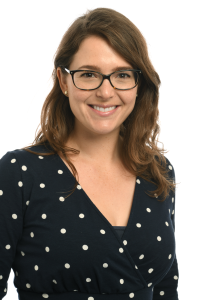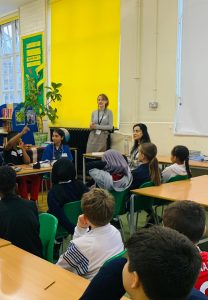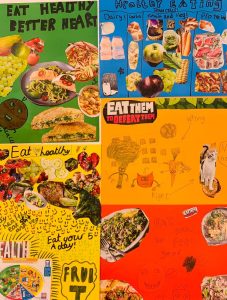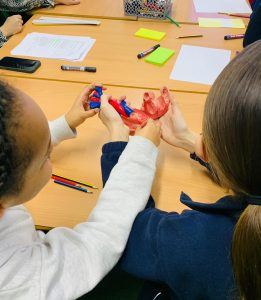by Dr Sian Powell
Students on their Year 6 General Practice Senior Assistantship (GPSA) placements are required to complete a quality improvement project (QIP) during their 4-week placement. By conducting a QIP we hope that the student will engage with the local patient community to make a sustainable difference.
Here is a recent example of a QIP that one of our Year 6 students, Alexandra Cardosa-Pinto, completed whilst on placement at The James O’Riordan Medical Centre with Dr Baskaran.
Here, Dr Baskaran first tells us about their experience of supervising the setting up of a new clinic at the practice as part of Alex’s QIP. Alex then shares her reflections on this experience and what she gained.
Dr Lavan Baskaran, GP Senior Partner, James O’Riordan Medical Centre, Sutton and Addington Medical Practice, Croydon
The James O’Riordan Medical Centre, was started in 1938. We’ve had a long tradition of teaching students and had the opportunity to support students from all five medical schools in London. Over the last few years, when it came to student projects, we’ve tried to avoid the usual audit on vitamin D or ECGs for those on Citalopram. This has shown both little impact for us as a practice, but also for the student.
We have been fortunate to have had very keen, inspiring students, who have taken on projects like Transgender clinics in Primary Care, ADHD stable follow up clinics (resulting in a prize at UCL) and more recently, a Chronic Kidney Disease-Diabetes Holistic clinic, designed and set up by Alexandra Cardosa-Pinto, a student from Imperial College. Initially, the assumption was this would be a very “medical” clinic, tackling proteinuria, hypertension and use of ACE-inhibitors and SGLT-2 inhibitors. However, a more rounded approach was taken, through Alexandra’s skill in health coaching, as well as genuine care and empathy and a desire to make a long term difference and leave a legacy effect.
It was a success! Patients were extremely grateful, telling us that her approach had given them the impetus to change their lifestyle, and others saying the traditional DESMOND diabetes teaching had not been inspiring, but that Alexandra, in one session, had been able to have them think differently. She had adapted her consultation to focus on their mental health, appreciating that this was barrier that did not allow for change, and addressing and supporting this would see the difference these patients needed. It was heartwarming to jointly consult the last patient, in her clinic, who offered her a hug for all the care and time she had given, and indicated she was very special for giving her time and effort for this.
Learning on aspects of both diabetes and chronic kidney disease were gained, as well as an appreciation for general practice, and the part it plays in chronic disease management in the community. Moving from what is good to eat and drink in kidney disease, to whether a lack of employment may be contributing to stress and therefore health was all included in the assessment.
As a practice, we have certainly learnt that chronic disease clinics, with a holistic angle can not only help our practices gain great feedback from patients, add a tick for CQC, but actually lead to a great project experience for medical students. The pride and energy that develops from allowing the student to develop the clinic on their own, with our oversight and then seeing the final creation with results, is fulfilling for patient, student and ourselves as teachers. It allows for other members of the practice to be included, such as social prescribers, mental health counsellors, paramedics and physician associates of the practice, and thereby leads to the imprinting of a clinic, that can be continued by the next student or adapted to support another chronic disease.
I have been teaching for a decade, and although students have always been a joy to teach, there was some lack of fulfilment from students walking away without a proud project. One of the very few rays of light to come from the pandemic was to allow some time to reflect on the student experience with us at the practice and being inspired to change project work to include a genuine interesting topic for the student whilst mobilising a new clinic in a short space of time.

Alexandra Cardoso Pinto, Year 6 Imperial College Medical Student:
I had an amazing time during GPSA; I genuinely felt part of a team (that was so welcoming to me) and felt like I was able to make a (even if only small) difference to patients.
Throughout the 4-weeks I was given the opportunity to consult patients independently and later set up my own clinic for patients with multiple comorbidities, where I not only performed physical health and medication reviews, but also had the chance to practice coaching skills to support lifestyle changes. I remember feeling incredibly out of depth in my very first consultation, but by the end, I found myself surprised at how natural those conversations became. These patients and our consultations were tremendously impactful in helping me see myself not just as a final year medical student, but as a (hopefully) soon-to-been junior doctor.
My time in GPSA also emphasised the value of working within a welcoming, diverse, multidisciplinary team. Alongside developing my clinical skills, I practiced communicating with different team members and gained better understanding of how different professionals have a unique (but each vital) role to play in a patient’s healthcare journey. From a more personal perspective, I also found that working within a friendly, supportive team makes a world of difference to overall happiness and motivation!
Finally, GPSA also highlighted the importance of having supervisors who I can ask for advice from and share my concerns with, who are ready to support my management plans – or constructively challenge them – and who enable me to practice holistic patient care.
I am grateful to everyone at the James O’Riordan Medical Centre for welcoming into their team and providing me with learning opportunities that I will carry forward throughout my career.
Read Quality Improvement Projects in GPSA – a GP Tutor and Year 6 student share their experience in full




